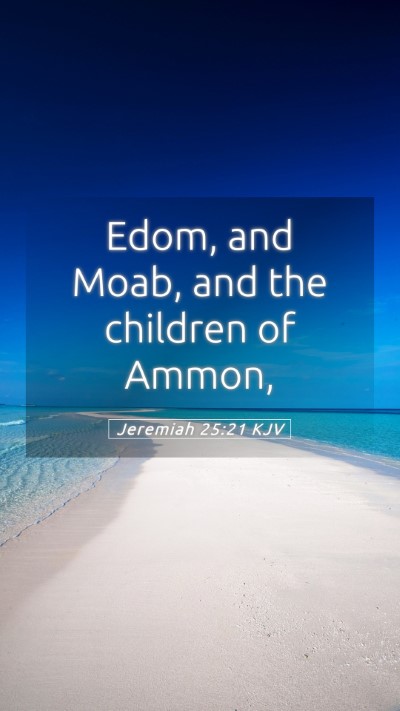Understanding Jeremiah 25:21
Verse: "And against the Arabian, and against the mingled people that dwell in the desert, and against the city of Dedan." (Jeremiah 25:21)
Bible Verse Meaning
This verse is part of a prophetic declaration by the prophet Jeremiah. It deals with the judgments that will fall upon various nations, including the Arab tribes and the people who dwell in desert regions. The mention of Dedan also highlights specific regional contexts.
Bible Verse Interpretations
- Matthew Henry: In his commentary, Henry provides insight into the broader implications of God's judgment regarding nations that oppose His will. He emphasizes that the Arabs and mingled peoples symbolize those who wander without a secure homeland, reflecting the spiritual disarray.
- Albert Barnes: Barnes points out that the 'mingled people' refers to heterogeneous groups. He suggests that this signifies the judgment not just on nations, but also on those lacking a clear identity in their faith, underscoring the need for authentic worship.
- Adam Clarke: Clarke elaborates on the geographical significance of Dedan and its inhabitants, indicating that this judgment also serves as a warning against complacency and the false security of regional identities in contrast to allegiance to God.
Bible Verse Understanding
The verse symbolizes the spiritual and physical plight of nations disconnected from God. It serves as a reminder of the consequences of straying from divine paths. Understanding this verse requires an awareness of the historical context of Jeremiah's prophecies, highlighting the moral implications for both individuals and collective entities.
Bible Verse Explanations
The actual context of Jeremiah 25 involves a declaration of judgment against various nations, stressing the importance of accountability for actions. Those referred to in this verse, including the Arabs and people of Dedan, faced judgment due to their own rejection of God's commandments.
Insights from Scripture Analysis
This prophecy not only underscores the need for divine justice but also reflects on the nature of God's relationship with non-Israelite nations. This expands our understanding of Scripture, suggesting that divine judgment is universal rather than restricted to Israel.
Biblical Exegesis
Through in-depth biblical exegesis, we uncover themes of accountability, identity, and divine sovereignty. The passage illustrates God’s active involvement in worldly affairs, underscoring the principle that no group is exempt from His righteous judgment.
Bible Study Insights
- Judgment is not limited to God's chosen people but extends to all nations.
- There are consequences for spiritual and moral decay, illustrated through the descriptions of diverse groups living without God’s guidance.
- Understanding the interrelations of nations and their accountability provides rich material for Bible study groups and discussions.
Cross References
- Isaiah 21:13-17: Prophecy against Arabia.
- Ezekiel 30:4: Judgment against various nations including Egypt.
- Zephaniah 2:8-10: Judgment against the nations surrounding Israel.
- Jeremiah 46:2: Prophecies against Egypt.
- Isaiah 34:1-2: Divine judgment against nations.
Application of Bible Verse
Understanding verses like Jeremiah 25:21 is essential for applying biblical teachings to our daily lives. This passage invites reflection on our individual and collective identities in faith. It reminds believers to remain aligned with God’s will and to heed the cautionary tales of nations that strayed from His path.
Conclusion
In summary, Jeremiah 25:21 offers a comprehensive look at divine judgment against nations characterized by spiritual neglect. Through a blend of historical and theological insights, we can appreciate the depth of its message. This and related verses serve as a rich source for Bible study resources, offering lessons that resonate with contemporary believers seeking deeper meaning and understanding in Scripture.


